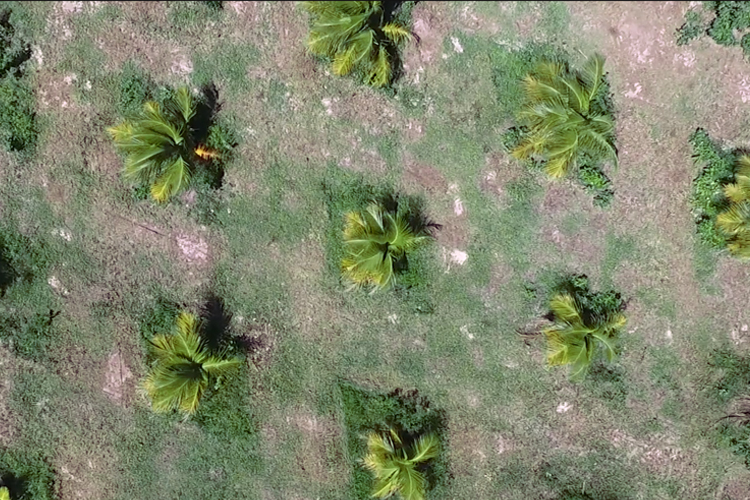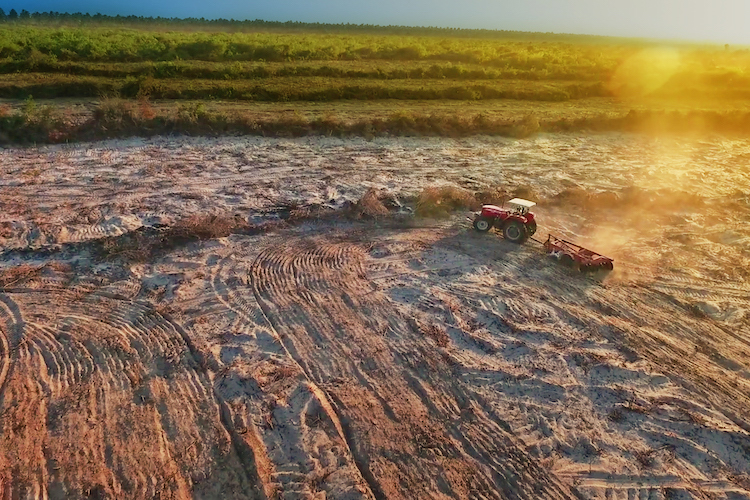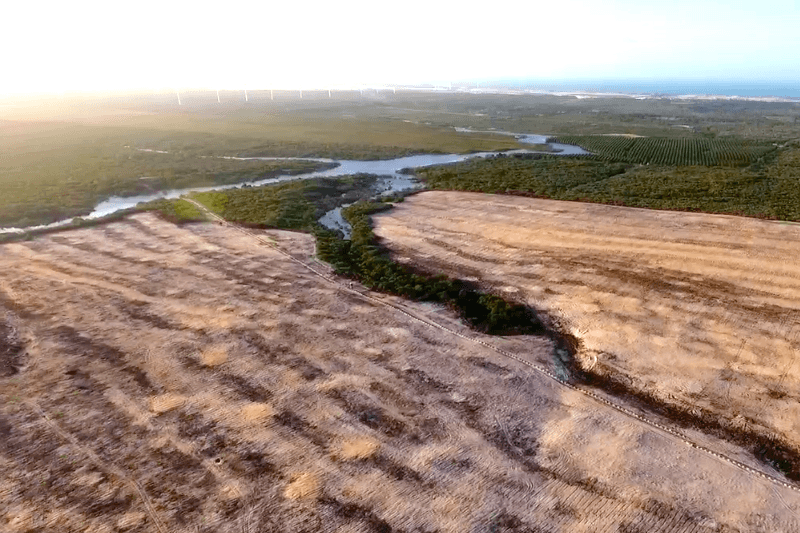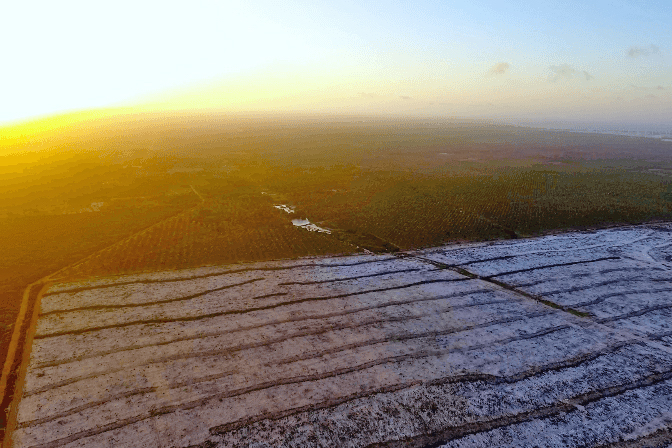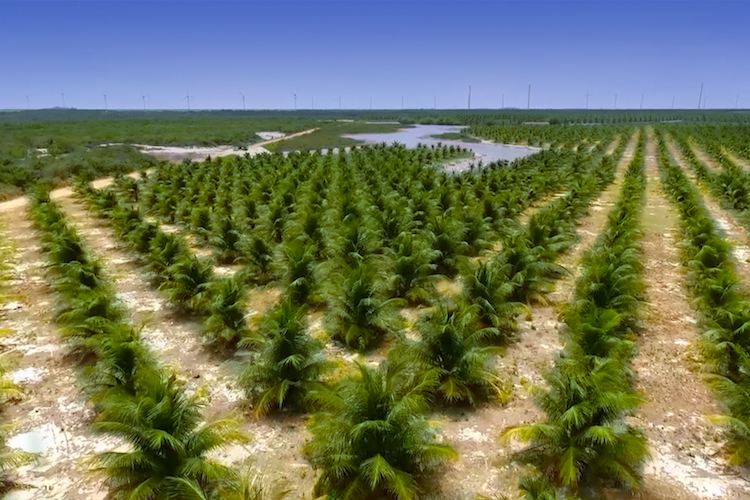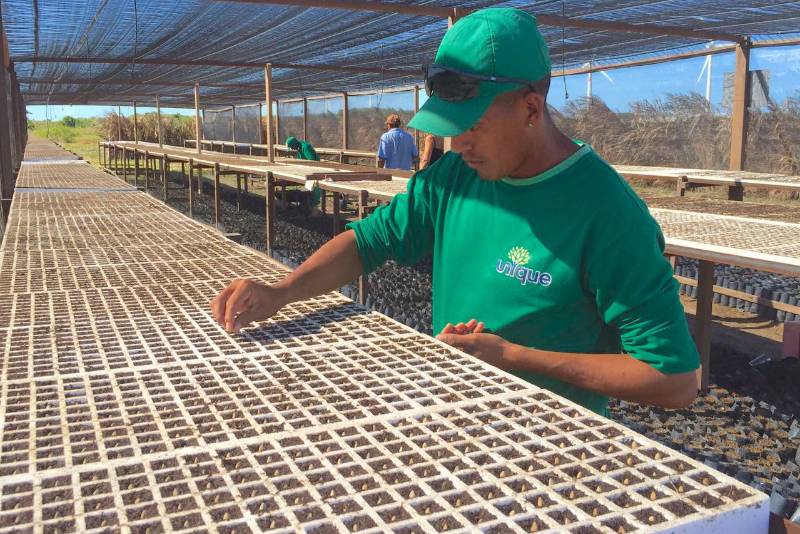April 18, 2016
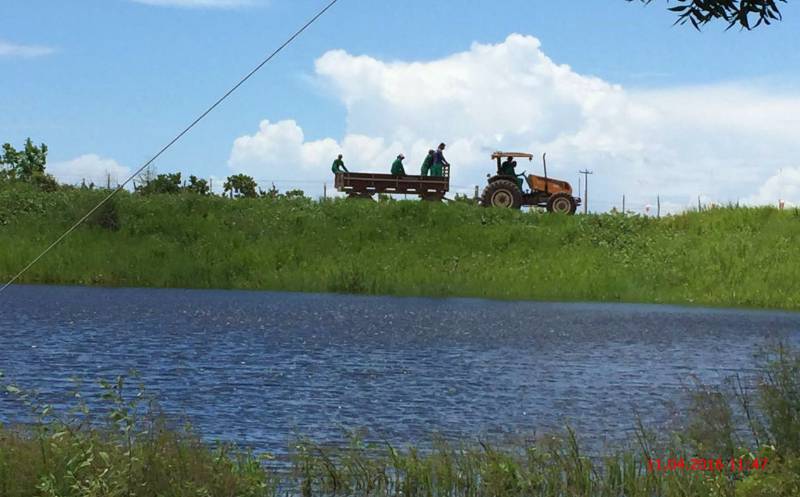
Ours is a time of rapid global change where the demands of a rising population are shifting human priorities towards the fundamental requirements for safeguarding life. The socioeconomic system of the past, geared towards productivity at any cost, has caused unstable consumption patterns, environmental harm and the unprecedented depletion of the planet’s strategic resources. Despite this increasingly challenging scenario we face, there is a solution: aligning the needs of man and nature to catalyze a revolutionary transformation in our industrial process. Ours is the first generation, empowered by innovation and technological development, making an active effort to emphasize stronger environmental, social and corporate governance criteria across all sectors. This will be essential in securing a prosperous future for all mankind.
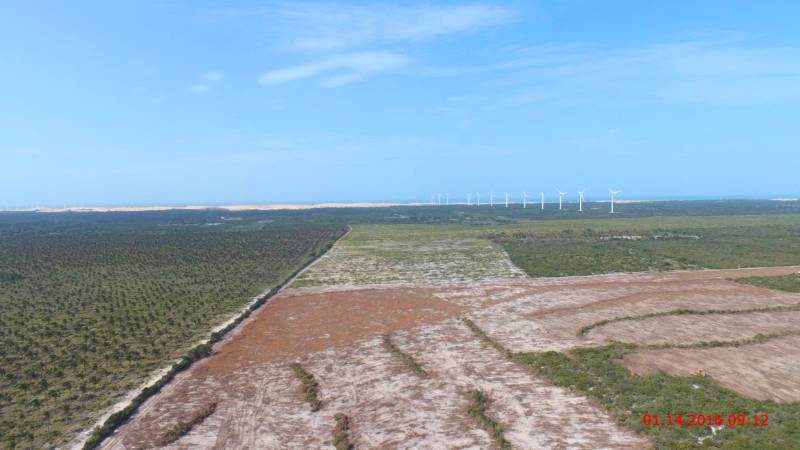 A new dawn breaks over our plantations
A new dawn breaks over our plantations
The prevalent theme holds especially true in the agricultural sector, which is famed for saving a billion people from starvation during the Green Revolution of the 1960s. Although industrialized agriculture and the rise of artificial crop care enabled our rising population to thrive well into a new millennium, farming techniques now rely on an unsustainable amount of water, energy and synthetic agrochemicals (often with little regard to any adverse and long-term effects to our environment and health). Responsible for consuming 70% of the planet’s available freshwater annually, eroding nearly 33% of the world’s high-quality arable land and causing 30% of global greenhouse gas emissions, these archaic solutions have become obsolete in the face of modern challenges.
The Great Balancing Act
In order to sustainably feed 9.6 billion people by 2050 three needs must be met at the same time
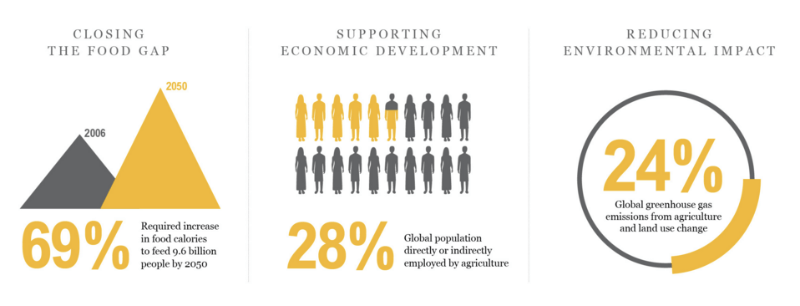 Source: World Resource Institute (2016)
Source: World Resource Institute (2016)
Leading the Way for Sustainable Crop Care
Understanding the major principles for safe, effective and sustainable crop care is essential for developing this evolved agricultural system that focuses on productivity in the long term. While synthetic agrochemicals have proven effective since their mainstream use during the Green Revolution, their secondary effects have now become a significant concern as they are increasingly responsible for the 10 million hectares of arable land that are degraded every single year. Instead of synthesizing new chemicals for use on our plantations, we have adopted a new and innovative approach – relying on the natural world for inspiration.
The Need to Manage Land in a Safe and Responsible Manner
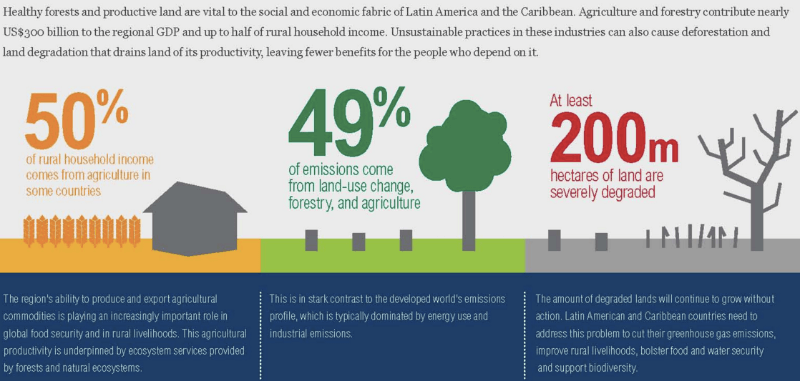 Source: FAO (2016)
Source: FAO (2016)
By applying technical knowledge specific to each pest and disease, alongside an expert understanding of the nutrients necessary for optimal crop development, we formulate the most effective blend of natural pesticides and fertilizers for use on our plantations. Naturally, a major ingredient in this blend is neem. The oil extract does not kill pests instantly and indiscriminately, but rather disarms only harmful insects, bugs and diseases. This leaves pollinators, beneficial insects and related fauna to provide the invaluable services the world (and agriculture) so desperately needs. Neem even serves as an organic fertilizer, strengthening the organic content in the soil by reducing its alkalinity and producing organic acids on decomposition. Being completely natural, this gift of nature is compatible with soil microbes that nurture healthy bacteria, increase water-holding capacity and proliferate aeration in the soil – ensuring productive soil health and stronger root development in all crops for generations.
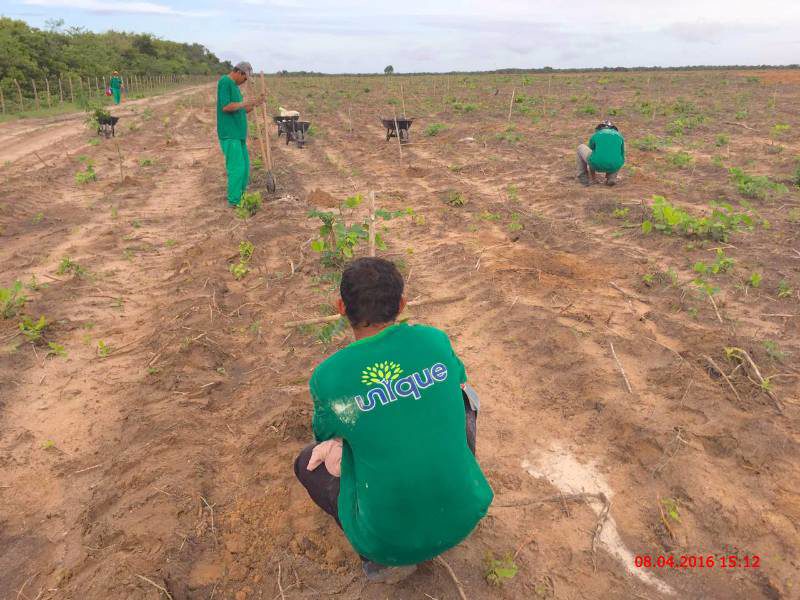 Each tree is given the utmost care and attention on our plantations to achieve the highest yields for generations to come.
Each tree is given the utmost care and attention on our plantations to achieve the highest yields for generations to come.
Fast approaching critical mass, organics are becoming a new frontier for crop protection and crop management. Whether utilized as a pesticide or fertilizer, natural products in crop care are the current agricultural saviors attracting both start-ups and heavyweights like Monsato, Bayer and DuPont by the billions of dollars. Using natural plant and mineral derivatives, in addition to the comprehensive methods we use to manage pests and improve yields, we avoid all the damaging consequences that are associated to synthetic agrochemical use.
We are even taking natural crop care a step further by implementing a rotational grazing system on our plantations, where livestock will regularly and systematically move around the land to maximize the quantity and quality of forage growth. Grazed lands allow new vegetation to renew energy reserves, rebuild shoot systems, and deepen root systems, ensuring long-term and maximum biomass production. This improves the natural fertility of the soil while reducing any costs associated with alternative treatment. Deploying our own cultures and systems of organic crop care, which are derived from the most modern and ancient ecological practices of plant nutrition and environmental conservation, we secure the optimal fertility of our soil and the protection of crops on our plantations at all times.
Safeguarding the Global Water Supply by Example
One of the major causes of water scarcity in the world today, agriculture is leaving rivers, lakes and underground water sources dry by consuming 70% of the planet’s available freshwater every year. This is exacerbated by the fact that 56% of total food production currently resides in areas of high or extreme water stress. The good news is that natural, organic and ecological practices in agriculture are paving the way towards a new and higher standard for water use around the world.
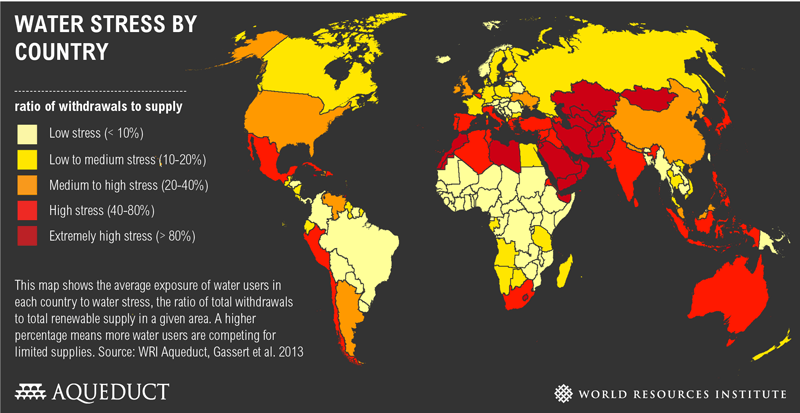 Source: World Resource Institute (2016)
Source: World Resource Institute (2016)
On our plantations we utilize the most efficient and sustainable irrigation technology the world has to offer, allowing us to calculate and distribute the exact water requirements for each of our crops on a daily basis. With equipment supplied by Netafim, the world’s leading specialists in irrigation infrastructure and technology, we are able to conserve the highest amount of water while ensuring the appropriate levels of hydration for every single tree on our plantations come rain or shine.
In order to further ensure sound water management throughout even the driest periods of the year, we are in the process of constructing a new water reservoir. Utilized as an additional water source supplying our newly developed pump house, this reservoir will be lined with a low permeability geomembrane to prevent water loss and act as safeguard from damaging UV and weather exposure. This is in addition to the eco dams and bore holes already implemented on our plantations, which have the combined capacity of 286 million gallons of water.
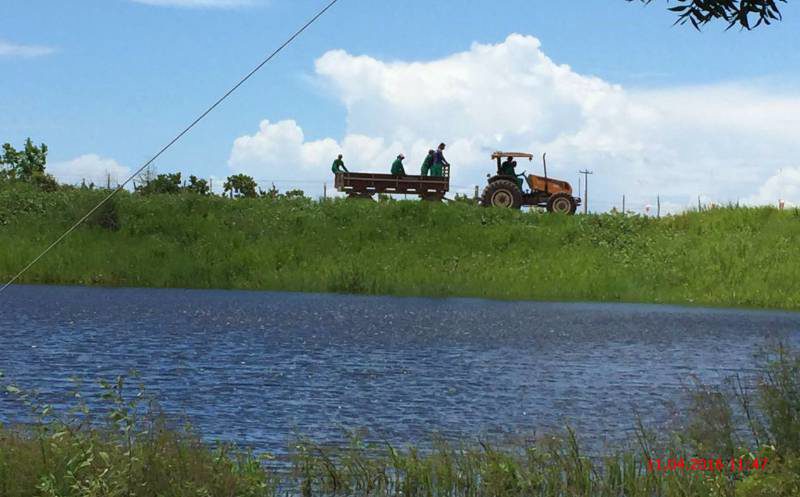 By investing significantly in our own eco dams, we continually strengthen our water reserves to supply the needs for the whole plantation at the lowest maintence and environmental cost possible.
By investing significantly in our own eco dams, we continually strengthen our water reserves to supply the needs for the whole plantation at the lowest maintence and environmental cost possible.
Utilizing the World’s Most Powerful Energy Source – the Sun
Energy for growing and harvesting crops is one of the most expensive and environmentally damaging factors of plantation management. Rather than proliferating the global use of fossil fuels, we are developing the capacity to harness the lasting and clean power of the sun across all of our projects. Ensuring that all infrastructures on our plantations have been designed to receive a photovoltaic supply of solar power, our ultimate objective is to meet the demands of our on-site facilities and irrigation systems in an entirely sustainable and environmentally friendly manner.
Fulfilling the Primal Needs of Man
Our greatest challenge is to transform the archaic system of modern agriculture into one that guarantees the nutritional needs of all are met in a safe, healthy and sustainable way. In order to achieve this objective, we continuously preserve and restore critical habitats, carefully manage our resource supply and naturally improve the condition of our soil and crops. We secure high yields, protect soil productivity and maintain environmental quality in the long term through our expert understanding and practice of sustainable agriculture in all of our projects.
By engaging with the primal needs of man, we aim to provide lower risk and higher returns than traditional asset classes. We are certain that in a world demanding and deserving of higher social responsibility, sustainable businesses such as our own will ensure a more conscious and profitable future for us all.

